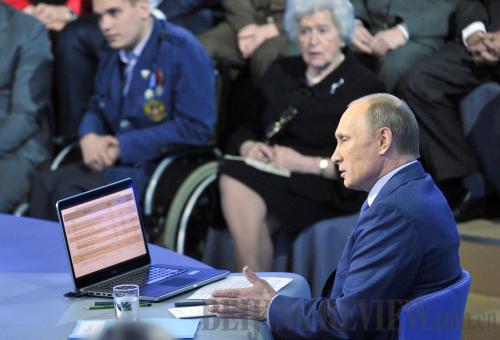|
 |
|
PUTIN PANEL: Russian President Vladimir Putin answers questions from the public in a live show on TV, radio and the Internet on April 25, in which he addressed Russia's economic policies and anti-corruption issues (XINHUA/AFP) |

Twenty years after the collapse of the Soviet Union, corruption has become a pervading quandary in Russia. According to the Corruption Perceptions Index 2012 released by the non-governmental organization Transparency International, Russia ranked No. 133 of 176 countries and territories. The ranking even lagged far behind some underdeveloped countries in Africa.
Anti-corruption is currently a global trend. Being one of the countries with a severe corruption problem, Russia's anti-corruption policies have become a worldwide focus.
Characteristics
Three characteristics summarize the nature of Russia's corruption:
First, the large-scale loss of former state assets in the early period of Russia's economic transformation. Russia carried out a massive systemic transformation after the Soviet Union disintegrated. A key component of the transformation was the privatization of mammoth state-owned enterprises. Some government officials and economic oligarchs swallowed former state assets through illegal methods like undervaluation and under-the-table auctions during the privatization process. According to information released by the State Duma, the lower house of the Russian parliament, Russia lost about 9,500 trillion rubles ($1.7 trillion at the exchange rate at the time) in the privatization process in 1997, about 4.2 times of Russia's total GDP in 1996.
Second, universal corruption among government officials of all ranks. Former Russian Prosecutor General Vladimir Ustinov said that about 80 percent of Russian officials were corrupt on some level. Statistics from the Russian Interior Ministry showed that average bribe-taking per Russian official in 2011 was 300,000 rubles ($9,120), much higher than the 2010 figure of 61,000 rubles ($1,855). Former Russian President Dmitry Medvedev once asserted that unscrupulous officials could misappropriate as much as $300 billion in state funds every year by colluding with businesspeople. Experts estimated that the money funneled for corruption in the country might equal $350 billion per year.
Third, Russian people have increasingly given tacit consent to corruption, accepting the practice as a part of daily life. Some citizens even participate in a range of corrupt activities. According to statistics from an anti-corruption investigation center in Russia, 20 percent of Russian citizens admitted to offering bribes in 2009. The percentage grew to 29 percent a year later. Statistics from Russia's Levada Center showed that about 88 percent of Russians have reported poor service while seeking help from government departments in recent years, and 53 percent of Russians admitted to engaging in acts of bribery to resolve their problems.
Corruption buster
The Russian Government adopted its first anti-corruption and anti-bribery law in 1992. In 1997, then Russian President Boris Yeltsin signed a presidential decree that required public servants to declare their assets. But neither the law nor the presidential decree had much practical effect.
When Vladimir Putin first came to power in 2000, he initiated an aggressive campaign against corruption. The Russian Government issued a series of anti-corruption laws on the civil service system beginning in 2002. Putin signed a presidential decree in 2003 establishing a commission against corruption and bribery that worked directly under the president. Anti-corruption supervision bureaus were later set up at procuratorial organs at different levels.
| 